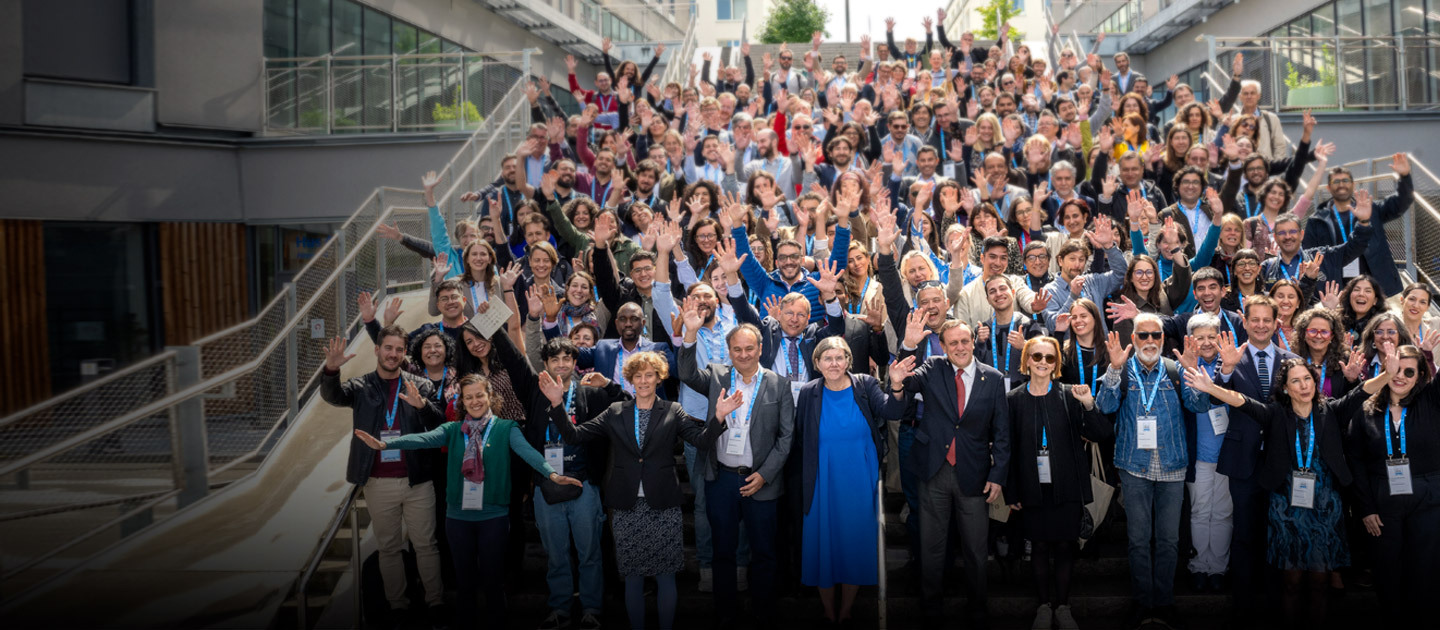
Over 170 Swedish and Chilean Researchers Collaborate on Sustainability Initiatives
24 July 2024
A delegation of over 100 representatives from Chile arrived this week in Stockholm for the fourth ACCESS Forum, an academic initiative that has been encouraging joint research and collaboration with Sweden on sustainability issues for almost a decade. UC Chile, one of the founding members, was represented by a delegation led by President Ignacio Sánchez and Vice President for Research Pedro Bouchon, along with directors, professionals, academics, and doctoral students.
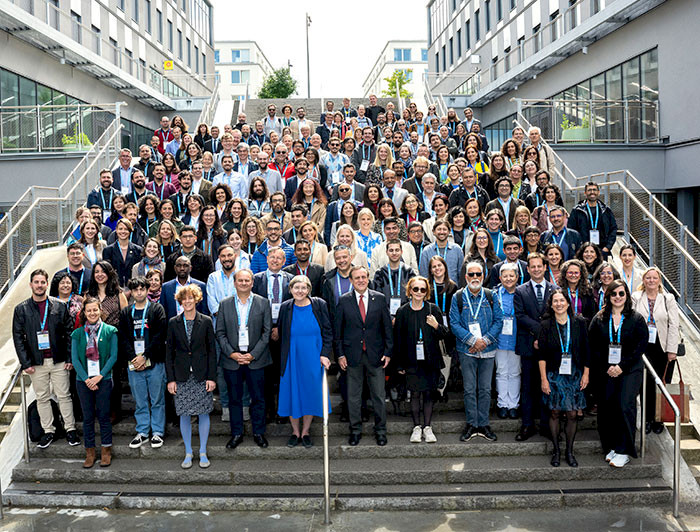
photo_camera "Collaboration between universities and governments can play a crucial role in laying the groundwork to address the major challenges the planet faces,” said President Ignacio Sánchez. (Photo credit: ACCESS Forum)
The Academic Collaboration Chile-Sweden Initiative (ACCESS) was founded nearly a decade ago. In 2015, discussions commenced between UC Chile's President Ignacio Sánchez and Lund University's then Vice-Chancellor Eva Wiberg, on their vision of how to build a bridge between the academic communities of Chile and Sweden.
Today, that vision is not only a reality, but it has grown steadily. Since the founding universities—Lund, Uppsala, Universidad de Chile, and UC Chile—signed the initial agreement, the initiative has grown to encompass 17 member universities across both countries: eight Swedish and nine Chilean. Four academic forums have been convened to date: Lund (2017), Santiago (2018), Punta Arenas (2022), and Stockholm (2024).
Sustainability is the central theme that unites researchers involved in ACCESS, with a particular focus on five of the 17 Sustainable Development Goals (SDGs) proposed by the United Nations:
- Good Health and Well-Being (Goal 3)
- Sustainable Cities and Communities (Goal 11)
- Life Below Water (Goal 14)
- Life on Land (Goal 15)
- Peace, Justice, and Strong Institutions (Goal 16)
As expressed by Ignacio Sánchez,the only Chilean university president participating in the forum: "ACCESS Chile-Sweden, an initiative which our institution helped to found nearly a decade ago, not only enhances academic collaboration between both countries but has also become a model for scientific diplomacy worldwide. Collaboration between universities and governments plays a crucial role in laying the groundwork to tackle global challenges like climate change while fostering global understanding and peace, which are essential today."
Collaboration, Exchange, and New Knowledge
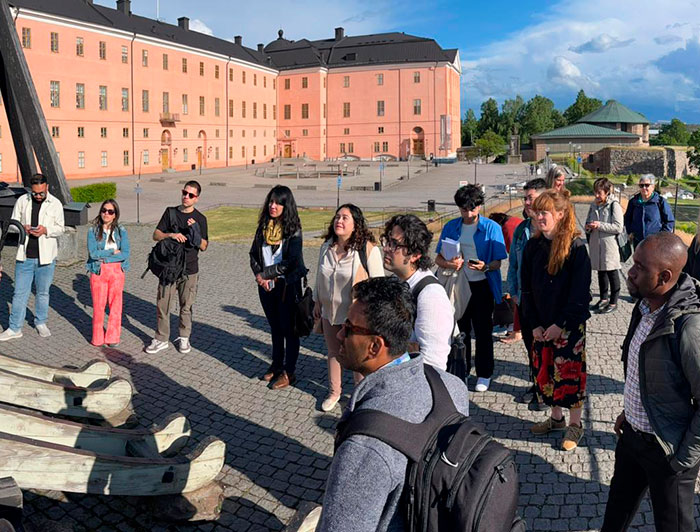
The fourth Chile-Sweden Academic Forum was held in Stockholm from June 10 to 14, with Stockholm University and the Royal Institute of Technology serving as hosts. The event hosted over 200 attendees, including university leaders, directors from participating institutions, representatives from various Swedish organizations, and Chile's Ambassador to Sweden, Tucapel Jiménez Fuentes.
Chile was represented by a large delegation of over 100 participants (27 from UC Chile), including university leaders, faculty members, doctoral students, and professionals.
On Thursday, June 13, Chilean President Gabriel Boric, as part of his European tour, participated in an ACCESS Forum meeting. He was joined by the Minister of Science, Technology, Knowledge, and Innovation, Aysén Etcheverry, and a delegation of scientists and academics that included the President of Universidad de Chile, Rosa Devés.
The forum aims to foster collaboration among doctoral students, young researchers, and senior scholars from Sweden and Chile, promoting the exchange of experiences and perspectives to advance new knowledge creation.
As Vice President for Research Pedro Bouchon emphasized, the ACCESS Forum has evolved into an “unparalleled platform for facilitating dialogue among diverse stakeholders from Sweden and Chile across academia, the public sphere, and industry. Our aim is to discover innovative approaches to forge and enhance scientific collaborations that drive progress towards achieving the United Nations' 2030 Agenda."
Ana María Sepúlveda, Director of Partnerships and Development of the Office of the Vice President for International Affairs, highlighted the profound impact of collaboration among universities. "It's crucial to instill in researchers the necessity and benefits of global collaboration at every career stage, as it's essential for addressing the major global challenges we face,” she said.
María Elena Boisier, Director of the Office of Research,emphasized that since its inception, the ACCESS Forum has served as a continuous platform for collaborative engagement across diverse topics. It fosters debate and the exchange of perspectives, knowledge, and experiences among academics from Sweden and Chile, showcasing the international nature of scientific inquiry.
Arrival of Young Researchers
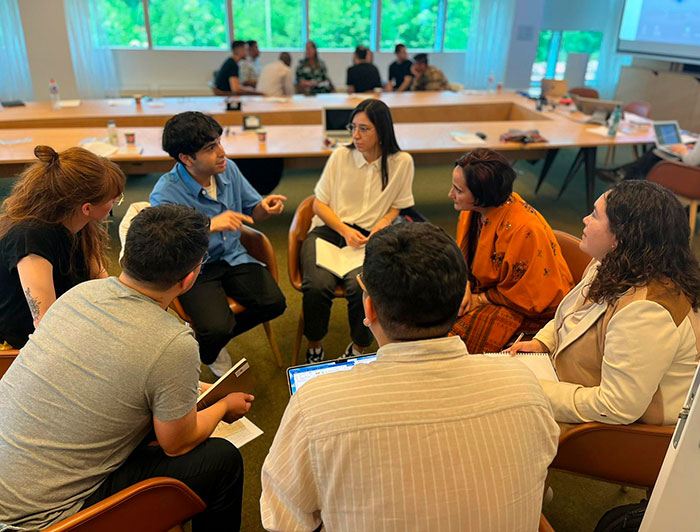
One of the forum's objectives is to involve and encourage young researchers at the beginning of their careers to work on sustainability topics from various fields.
As part of this effort, doctoral students were given a special challenge: to present their research in just 3 minutes. This challenge is based on the 3MT® (Three Minute Thesis) competition, which originated at the University of Queensland. The goal is for participants to practice their communication skills, effectively explaining their scientific work to a lay audience in a clear and compelling manner.
Bárbara Peña, a doctoral student in the Biological Sciences Program majoring in Molecular Genetics and Microbiology, shared her thoughts: "The experience here has been quite enriching, significantly broadening my horizons and deepening my understanding of sustainability." She emphasized the value of participating in a group with researchers from diverse and varied fields: "This interdisciplinary approach is incredibly enriching, and I believe such opportunities should be more frequent." She added, "It's also about encountering a different reality from Chile, especially that of Sweden. I think this motivates us, as Chileans, to both emulate Sweden's example and to value the progress we have already made."
Another participant, Ulda Figueroa, a doctoral candidate in Sociology, attended the forum in Punta Arenas two years ago and wanted to participate again this year in Stockholm: "The forum has been really interesting because I've never experienced a working dynamic like ACCESS before, especially compared to my previous experiences at other national congresses. What I have enjoyed most is the opportunity to talk with young researchers and with more experienced professors, from our universities and from Sweden. It has been an opportunity to learn the practices and rituals of academic life in a peer environment,” he said about his experience in 2022.
The event also featured two talks – "Decolonizing Research: Issues, Debates and Targets" by Suruchi Thapar-Björket and "Social Justice and Multilingual Communities" by Rakel Österberg and Alicia Salomone. Additionally, there was a group work session and a plenary session.
According to President Ignacio Sánchez: “It's inspiring to witness the dedication of researchers, particularly the younger generation, as they forge networks of collaboration aimed at advancing our country and the region." This nurtures an environment of cooperation that strengthens global scientific collaboration, starting with the bolstering of national networks. The turnout was extraordinary, with over a hundred students and academics from 9 universities in Chile.
UC Chile Ambassadors Across the Spectrum of Knowledge
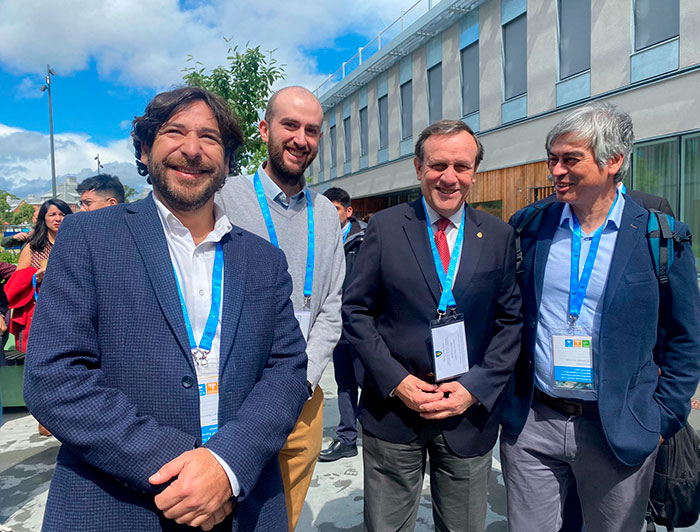
In total, 13 research workshops were held during the forum, addressing various sustainability-related topics. Five of these workshops were led by UC Chile faculty members.
One of the leaders was Diego Castro, a professor at the Institute of Music within the Faculty of Arts. He was the Principal Investigator (PI) of a workshop on artistic research, experimentation, and cultural sustainability. This workshop, proposed and led by Castro along with his Swedish colleague Michael Edgerton, from Lund University, focused on exploring artistic research as a pivotal aspect of knowledge production.
"We analyzed the role of artists and researchers in academia, as it has great potential. In Chile, artistic research is not recognized as research, unlike in Sweden and other Nordic and European countries. We argued that by developing artistic research and applying the principles of open science (or open knowledge), we can empower communities to create their own culture through the transformative power of the arts, ultimately leading to more sustainable communities," said Diego Castro.
In the field of public health,Marcela Sjöberg Herrera, a professor from the Faculty of Biological Sciences, led a workshop with her colleague Carlos Guerrero from Uppsala University. Their group focused on "Environmental exposures in Chile and Sweden linked to human diseases that can alter key biological programs modulating the proper functioning of our genes and, consequently, organisms," she explained.
Specifically, Professor Sjöberg led discussions among researchers from various disciplines who have studied exposure to heavy metals, pesticides, and obesity. "This allows us to explore interdisciplinary and transdisciplinary synergies to develop and implement proposals to educate the general public and inform decision-makers about the lessons we’ve learned," said Marcela Sjöberg, detailing their efforts to "translate scientific evidence into effective prevention and regulatory strategies that can protect the health of the population and future generations and reduce the costs of diseases linked to these exposures."
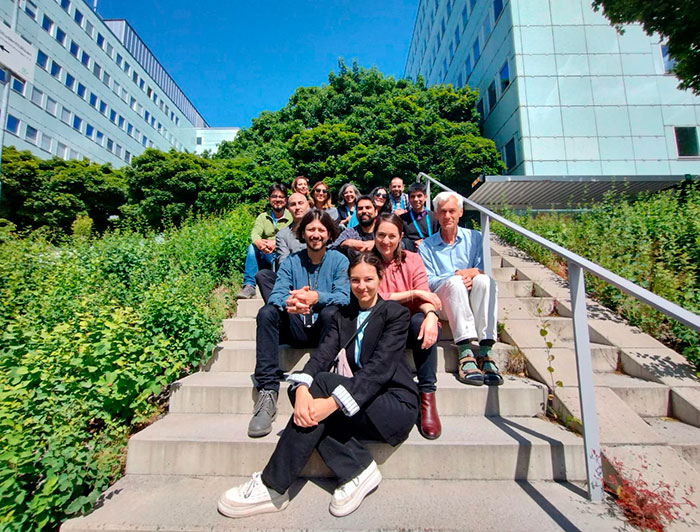
Felipe Irarrázaval, a postdoctoral researcher and professor at the Institute of Urban and Territorial Studies, led a workshop on"The Politics of Energy Transition." This workshop addressed how the political process of transitioning from fossil fuels to unconventional renewable energies and the resulting demand for minerals impacts communities in both Chile and Sweden.
Felipe Irarrázaval and his group will conduct a comparative study between Chile and Sweden to analyze the geographical relationships of these dynamics. "Some of the minerals extracted in Chile are processed and transformed into products like batteries in plants here in Sweden, and those batteries end up in cars bought here. We are connected in production networks," explained the researcher.
The "Crime as a Social Problem" workshop brought together a diverse group of researchers led by Patricio Domínguez, a professor from the School of Engineering. "This group is made up of experts from fields such as economics, sociology, political science, criminology, law, and social work, all working with different methods. It's a very interesting and challenging group due to its diversity. We share a concern about crime, a significant issue in both Chile and Sweden," said Professor Domínguez.
Through the presentation of papers—around ten in total—and guest talks, the group analyzed the increasing homicide rates in both countries and the implementation of "tough on crime" policies, which are ineffective and costly for the judicial system in the long run.
"It has been fascinating to discover that despite the significant institutional and cultural differences, there are similarities between Chile and Sweden in addressing these issues. This also presents a challenge in communicating to the political system that solutions should be based on the best available evidence," explained Patricio Domínguez.
Phillip Dettleff, a professor from the School of Veterinary Medicine, along with Cristina Sandel from the University of Gothenburg, conducted the workshop "Sustainable Aquatic Fruit and Biomaterial Productions," which focused on aquaculture diversification. "In simple terms, it’s about how we can generate new species, especially native ones, to diversify aquaculture production with species that have less impact, and how we can transform aquaculture into a more sustainable and integrative practice that is environmentally friendly, sustainable over time, and competitive," explained the professor.
Through their current efforts, they aim to leverage Chile's experience in large-scale production and its historical context to benefit their Swedish colleagues, while also gaining insights from Sweden's advancements in sustainable aquaculture approaches. The goal is to exchange experiences, expand collaboration networks among universities involved in the workshop, and generate joint projects related to sustainability, including student and researcher exchanges.
UC Chile also participated in five other workshops related to challenges and experiences in biodiversity in Chile and Sweden; innovations to preserve coastal seas; collective action for just, inclusive, and sustainable societies; sustainable agricultural systems; and sustainable water use, food security, and transformative climate policy. (Learn more about all the workshops)
Contributions and Challenges
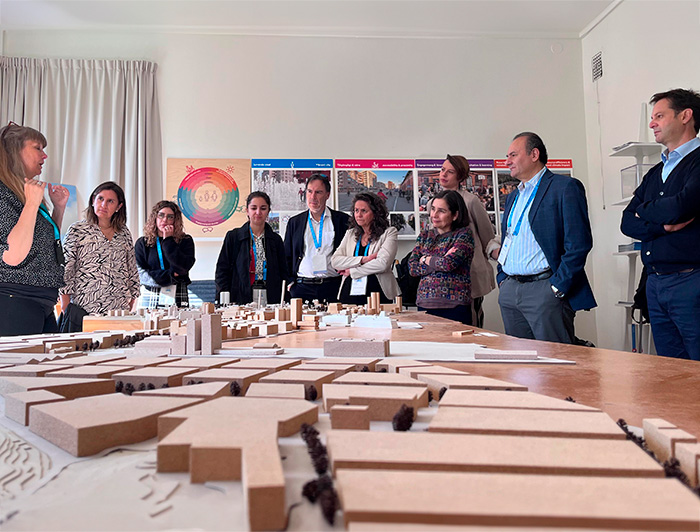
Alongside the workshops, on Tuesday, June 11th, a Scientific Diplomacy Panel between Chile and Sweden took place, with opening remarks delivered by UC Chile Vice President for Research Pedro Bouchon. "This panel has crucial strategic importance and also a great responsibility: to reinforce our strengths, discover potential synergies, and identify the barriers we must overcome to foster deeper collaboration,” he said.
Additionally, the Vice President presented a panel at the Stockholm Resilience Center addressing the challenges of research in a volatile global environment. He underscored the pivotal role of social science research centers in universities, emphasizing the need to understand misinformation, enhance media literacy, and foster ethical and critical thinking among future leaders committed to sustainability.
Other activities included a visit to the Stockholm Royal Seaport, a former industrial and port area being transformed into a neighborhood that will house about 12,000 people by 2030, focused on sustainable urban development and the use of new technologies.
As María Elena Boisier, Director of the Office of Research, concluded: "We have convened in diverse locations and regions: currently in Stockholm, and in 2025, we will convene in southern Chile, hosted by University of Concepción. Today's challenges require a global, comprehensive perspective, encompassing various territories."
Academic Collaboration Chile-Sweden (ACCESS) is a collaborative platform of eight Swedish universities and nine Chilean universities.
Swedish Participants:
- Lund University
- Uppsala University
- Royal Institute of Technology
- Stockholm University
- University of Gothenburg
- Södertörn University
- Swedish University of Agricultural Sciences
- Kristianstad University
En el caso de Chile, sus miembros son:
- UC Chile Participants:
- Universidad de Chile
- Universidad de Concepción
- Universidad de Magallanes
- Universidad de Santiago de Chile
- Universidad de O´Higgins
- Universidad de Aysén
- Universidad de La Frontera
- Universidad Técnica Federico Santa María




